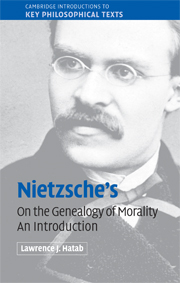Book contents
1 - Nietzsche's thought and life
Published online by Cambridge University Press: 05 June 2012
Summary
What follows is not an overview of all or most of the main elements of Nietzsche's thought but a sketch of those elements that I think will have particular relevance in engaging the Genealogy.
FROM METAPHYSICS TO NATURALISM
We can best gain entry to Nietzsche's philosophy by beginning with his critique of metaphysics. According to Nietzsche, “the fundamental faith of the metaphysicians is the faith in opposite values” (BGE 2). The Western religious and philosophical tradition has operated by dividing reality into a set of binary opposites, such as constancy and change, eternity and time, reason and passion, good and evil, truth and appearance – opposites that can be organized around the concepts of being and becoming. The motivation behind such divisional thinking is as follows: Becoming names the negative and unstable conditions of existence that undermine our interest in grasping, controlling, and preserving life (because of the pervasive force of uncertainty, variability, destruction, and death). Being, as opposite to becoming, permits the governance or exclusion of negative conditions and the attainment of various forms of stability untainted by their fluid contraries.
Nietzsche wants to challenge the priority of being in the tradition, so much so that he is often read as simply reversing this scheme by extolling sheer becoming and all its correlates. This is not the case, even though Nietzsche will often celebrate negative terms rhetorically to unsettle convictions and open up space for new meanings.
- Type
- Chapter
- Information
- Nietzsche's 'On the Genealogy of Morality'An Introduction, pp. 8 - 24Publisher: Cambridge University PressPrint publication year: 2008

